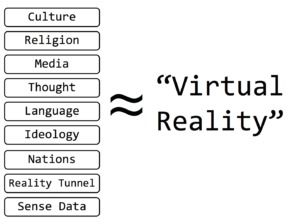A Lifeboat guest editorial
Richelle Ross is a sophomore at the University of Florida, focusing on statistics and data science. As a crypto consultant, she educates far beyond the campus. Her insight on the evolution and future of Bitcoin has been featured in national publications. Richelle writes for CoinDesk, LinkedIn, and Quora, providing analysis on Bitcoin’s evolving economy.
In 2003, I remember going to see my first IMAX 3D film, Space Station . My family was touring NASA at Cape Canaveral Florida. The film was an inside view into life as an astronaut enters space. As the astronauts tossed M&Ms to each other in their new gravity-free domain, the other children and  I gleefully reached our hands out to try and touch the candy as it floated towards us. I had never experienced anything so mind-blowing in my 7 year life. The first 3D film was released in 1922. Yet, surprisingly, flat entertainment has dominated screens for in the 9½ decades that followed. Only a handful of films have been released in 3D—most of them are animated. But now, we are gradually seeing a shift in how people experience entertainment. As methods evolve and as market momentum builds, it promises to be one of the most groundbreaking technologies of the decade. I foresee Virtual Reality reaching a point where our perception of virtual and real-life experiences becomes blurred—and eventually—the two become integrated.
I gleefully reached our hands out to try and touch the candy as it floated towards us. I had never experienced anything so mind-blowing in my 7 year life. The first 3D film was released in 1922. Yet, surprisingly, flat entertainment has dominated screens for in the 9½ decades that followed. Only a handful of films have been released in 3D—most of them are animated. But now, we are gradually seeing a shift in how people experience entertainment. As methods evolve and as market momentum builds, it promises to be one of the most groundbreaking technologies of the decade. I foresee Virtual Reality reaching a point where our perception of virtual and real-life experiences becomes blurred—and eventually—the two become integrated.
Ever since pen was put to paper, and camera to screen, audiences have enjoyed being swept into other worlds. For those of us “dreamers” being able to escape into these stories is one way we live through and expand our understanding of other times and places—even places  that may not be accessible in our lifetimes. Virtual reality is the logical progression and natural evolution of these experiences.
that may not be accessible in our lifetimes. Virtual reality is the logical progression and natural evolution of these experiences.
I caught the VR bug after one of my Facebook contacts was posting about it and sharing 360 degree videos that were of no use to me unless I too had the headset. Having been a Samsung user for the last several years, I purchased the Samsung VR headset to understand what all the hype was. Just as with my childhood experience visiting the space station, the VR Introduction video sent me floating across the universe. But this time, it was much more compelling. I could turn my head in any direction and experience a vast heavenly realm in 3D vision and tied to my own movements. Behind me was a large planet and in front were dozens of asteroids slowly moving by.
Similar to visiting the Grand Canyon, this is one of those novel experiences you really have to experience to appreciate. Within about ten seconds of trying it out, I had become hooked. I realized that I was experiencing something with far greater potential than an amusement park roller coaster, yet I also recognized that any applications I might imagine barely scratch the surface. This unexpected adrenaline rush is what leads tinkerers to the imaginative leaps that push new technologies into the next decades ahead.
Video games are probably the industry everyone thinks of being affected by this new paradigm. I immediately thought about the Star Wars franchise with its ever expanding universe. It will be a pretty exciting day when you can hold a lightsaber hilt that comes to life when you wear a headset and allows you to experience that universe from your living room. You could even wear a sensored body suit that allows you to feel little zaps or vibrations during gameplay. With more connected devices, the possibility of Li-Fi replacing Wi-Fi and so on, video games are just scratching the surface.
I discussed what the future of VR could offer with Collective Learning founder, Dan Barenboym. We explored various difficulties that impede market adoption. Barenboym was an early enthusiast of virtual reality, having worked with a startup that plans to deploy full-body scanners that give online life to gamers. The project began long before the film Avatar. Berenboym suggests ways that this would improve online shopping  by allowing people to see their avatar with their own personal measurements in various outfits. This doesn’t have to be limited to at-home experiences though. Dan suggests that instead of walking into the boutique changing room, you walk into one with mirrors connected to VR software. Your reflection ‘tries on’ different virtual outfits before you pull your favorite one off the store rack.
by allowing people to see their avatar with their own personal measurements in various outfits. This doesn’t have to be limited to at-home experiences though. Dan suggests that instead of walking into the boutique changing room, you walk into one with mirrors connected to VR software. Your reflection ‘tries on’ different virtual outfits before you pull your favorite one off the store rack.
We also discussed the current obstacles of VR like the headset itself, which is a hindrance in some respects as it is a bit uncomfortable to wear for prolonged use. The other looming issue is money. There are many ideas similar to the ones we brainstormed, but startups may struggle to get off the ground without sufficient funding. The Oculus Rift is one great example of how crowdfunding can help entrepreneurs launch their ideas. It is easier than ever before to share and fund great ideas through social networking.
Facebook creator, Mark Zuckerberg, shared his own vision in 2014 after acquiring the Oculus Rift. Zuckerberg eloquently summarized the status of where we’re headed:
“Virtual reality was once the dream of science fiction. But the internet was also once a dream, and so were computers and smartphones. The future is coming and we have a chance to build it  together.”
together.”
What could this mean for the social networking that Zuckerberg pioneered? I’d venture to say the void of a long distance relationship may be eased with VR immersion that allows you to be with your family at the click of a button. You could be sitting down in your apartment in the U.S., but with the help of a 360 camera, look around at the garden that your mother is tending to in the U.K. The same scenario could be applied to a classroom or business meeting. We already have global and instant communication, so it will serve to add an enriched layer to these interactions.
The concept of reality itself is probably the biggest factor that makes virtual reality so captivating. Reality is not an objective experience. Each of us has a perspective of the world that is colored by our childhood experiences, personality, and culture. Our inner dialogues, fantasies of who we want to become, and areas of intelligence determine so much of what we’re able to accomplish and choose to commit to outside of ourselves. Michael Abrash describes how VR works with our unconscious brain perceptions to make us believe we’re standing on the edge of a building that isn’t really there. At a conscious level, we accept that we are staring at a screen, but our hearts still race—based on an unconscious perception of what is happening. Tapping into this perception-changing part of our brain allows us to experience reality in new ways.
As VR becomes more mainstreamed and incorporated into all areas of our lives such as online shopping, socializing, education, recreation, etc., the degrees of separation from the real world that society applies to it will lessen. Long-term, the goal for VR would be to allow us to use any of our senses and body parts. We should see continued improvements in the graphics and interaction capabilities of VR, allowing for these experiences to feel as real as they possibly can.
One can only imagine the new vistas this powerful technology will open—not just for entertainment, but for education, medicine, working in hazardous environments or controlling machines at a distance. Is every industry planning to incorporate the positive potential of virtual reality? If not, they certainly should think about the potential. As long as we pay attention to present day needs and issues, engineering virtual reality in the Internet of Things promises to be a fantastic venture.
Author’s Note:
Feedback from Lifeboat is important. I’ll be back from time to time. Drop me a note on the comment form, or better yet, add your comment below. Until then, perhaps we will meet in the virtual world.
— RR




 by allowing people to see their avatar with their own personal measurements in various outfits. This doesn’t have to be limited to at-home experiences though. Dan suggests that instead of walking into the boutique changing room, you walk into one with mirrors connected to VR software. Your reflection ‘tries on’ different virtual outfits before you pull your favorite one off the store rack.
by allowing people to see their avatar with their own personal measurements in various outfits. This doesn’t have to be limited to at-home experiences though. Dan suggests that instead of walking into the boutique changing room, you walk into one with mirrors connected to VR software. Your reflection ‘tries on’ different virtual outfits before you pull your favorite one off the store rack. together.”
together.”